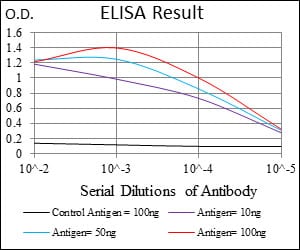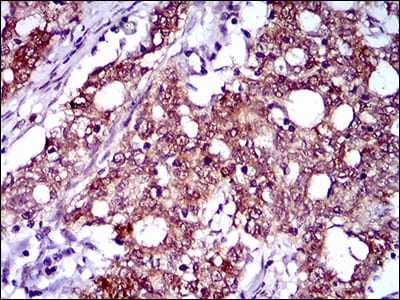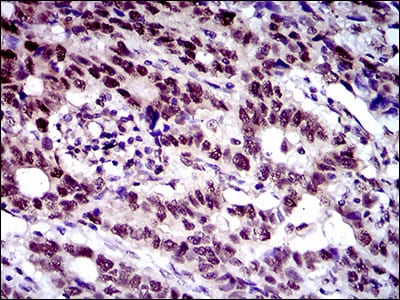


| WB | 咨询技术 | Human,Mouse,Rat |
| IF | 咨询技术 | Human,Mouse,Rat |
| IHC | 1/200 - 1/1000 | Human,Mouse,Rat |
| ICC | 技术咨询 | Human,Mouse,Rat |
| FCM | 咨询技术 | Human,Mouse,Rat |
| Elisa | 1/10000 | Human,Mouse,Rat |
| Aliases | CASH; FLIP; MRIT; CLARP; FLAME; Casper; FLAME1; c-FLIP; FLAME-1; I-FLICE; c-FLIPL; c-FLIPR; c-FLIPS; CASP8AP1 |
| Entrez GeneID | 8837 |
| clone | 6G11A6 |
| WB Predicted band size | 55.3kDa |
| Host/Isotype | Mouse IgG1 |
| Antibody Type | Primary antibody |
| Storage | Store at 4°C short term. Aliquot and store at -20°C long term. Avoid freeze/thaw cycles. |
| Species Reactivity | Human |
| Immunogen | Purified recombinant fragment of human CFLAR (AA: 100-251) expressed in E. Coli. |
| Formulation | Purified antibody in PBS with 0.05% sodium azide |
+ +
以下是关于CFLAR抗体的3篇参考文献示例(文献信息为模拟示例,仅供参考):
---
1. **文献名称**:*CFLAR modulates apoptosis and inflammatory responses in hepatocellular carcinoma via caspase-8 inhibition*
**作者**:Li, X. et al.
**摘要**:该研究利用CFLAR特异性抗体,通过Western blot和免疫组化分析,揭示CFLAR在肝癌中通过抑制caspase-8活性调控细胞凋亡,并与患者不良预后相关。
2. **文献名称**:*A novel monoclonal antibody against CFLAR for detecting its expression in autoimmune disorders*
**作者**:Wang, Y. et al.
**摘要**:研究团队开发了一种高特异性抗CFLAR单克隆抗体,验证其在流式细胞术和免疫荧光中的应用,并发现CFLAR在系统性红斑狼疮患者T细胞中表达异常,提示其免疫调节功能。
3. **文献名称**:*CFLAR-mediated NF-κB signaling as a therapeutic target in chronic inflammation*
**作者**:Zhang, L. et al.
**摘要**:通过CFLAR抗体阻断实验和基因敲除模型,证明CFLAR通过调控NF-κB通路抑制炎症因子释放,为类风湿性关节炎等疾病提供潜在治疗靶点。
---
如需真实文献,建议通过PubMed或Google Scholar搜索关键词“CFLAR antibody”、“CFLAR immunohistochemistry”或“CFLAR signaling”获取。
The CFLAR (CASP8 and FADD-like apoptosis regulator) antibody is a crucial tool for studying the regulation of apoptosis and inflammatory signaling. CFLAR, also known as c-FLIP (cellular FLICE-inhibitory protein), is a key anti-apoptotic protein that modulates caspase activation through its interaction with death receptor signaling pathways. Structurally similar to caspase-8 and caspase-10 but lacking proteolytic activity, CFLAR exists in multiple splice variants (e.g., c-FLIPL, c-FLIPS) that competitively inhibit the formation of active caspase-8 homodimers at death-inducing signaling complexes (DISCs). This regulation impacts cell fate decisions, balancing survival, apoptosis, and necroptosis.
CFLAR antibodies are widely used in research to detect protein expression via techniques like Western blotting, immunohistochemistry, and flow cytometry. They help elucidate CFLAR's roles in pathological conditions, including cancer (where overexpression contributes to therapy resistance), autoimmune disorders, and neurodegenerative diseases. Studies also explore its involvement in NF-κB activation and inflammatory responses. However, researchers must account for isoform specificity when selecting antibodies, as different variants exert opposing effects on cell survival. Commercial CFLAR antibodies are typically validated against recombinant proteins or cell lines with known expression profiles to ensure reliability.
×